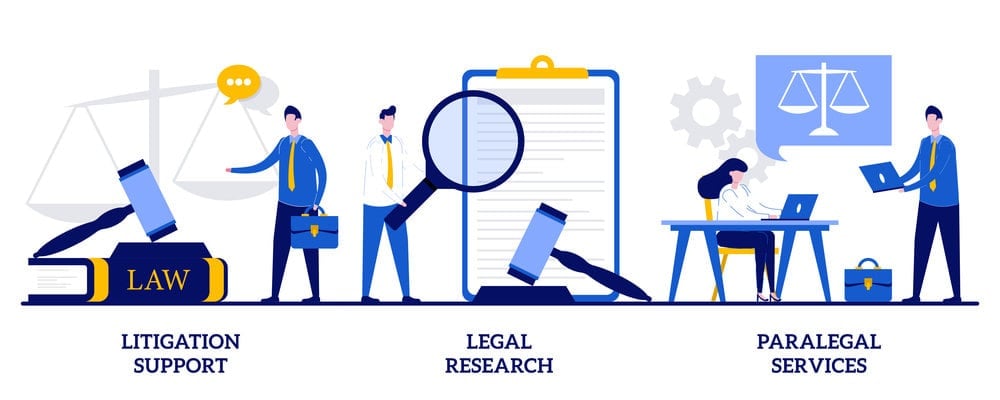In today’s fast-paced world, the legal industry provides little to no room for mistakes while doing thorough investigations. However, legal research and writing require extensive, persuasive, and concise strategies honed through education and long years of experience.
Unfortunately, law firms with workloads related to client handling, documentation, and court trial struggle to build strong grounds for the case. This is where legal research services come into play.
These service providers offer customized and cost-efficient solutions to law firms, legal departments, and lawyers like you. It enables you to formulate crucial decisions, serving as an extension to your internal legal department. Whether simple or complex research, including litigation and non-litigation tasks, these service providers become your one-stop solution.
 Importance of Legal Research for Lawyers
Importance of Legal Research for Lawyers
For lawyers like you, legal research holds immense significance. Besides trial skills and presenting the case in court, lawyers should possess legal research skills to win the case. Legal research is complex.
Lawyers must explore primary and secondary sources, including legal books, magazines, the internet, and more. Lawyers must decide on the types of legal research that best suits their clients’ situations. It can be descriptive, analytical, applied, fundamental, quantitative, qualitative, conceptual, and empirical.
However, legal research is time-consuming yet highly important. This is where seeking help can tremendously save you valuable time that can be reclaimed in understanding the client’s situation by meeting them in person.
For instance, if you keep researching and writing, managing your legal team, preparing trial documents, and coordinating with witnesses will become next to possible. So, there’s no harm in opting for a legal research service provider.
What are the Challenges and Considerations in Legal Research?
- Vast Information Available: With countless statutes, case law, regulations, legal treatises, law reviews, and other legal materials, it can be challenging to identify relevant and reliable sources.
- Complexity and Constant Change: Lawyers must keep track of legislative changes, new court decisions, and legal interpretations, which can be time-consuming and difficult.
- Multiple Jurisdictions: Different jurisdictions have their legal systems and regulations, which means legal researchers must be well-versed in the laws of various countries, states, or regions when dealing with multi-jurisdictional matters.
- Authenticity and Credibility: Ensuring the authenticity and credibility of legal sources is crucial because outdated data can lead to repercussions in legal cases.
- Accessible Data: Some legal materials may be behind paywalls, making it challenging for researchers with limited access to vital information.
- Ambiguity and Interpretation: Legal texts can be ambiguous and subject to different interpretations. Lawyers must carefully analyze cases and statutes to understand their meaning and application.
- Ensuring Reliable Online Sources: While the Internet has made legal research more accessible, it also raises concerns about the reliability and accuracy of online resources.
Considerations
- Purpose of Research: The objective of legal research and scope should be clear to ensure the focus remains on relevant information.
- Primary vs. Secondary Sources: Distinguish between primary sources (original laws, court decisions) and secondary sources (legal commentary, treatises) to understand their different roles in legal analysis.
- Validity of Citations: Verify the authenticity and relevance of cited cases and statutes to strengthen the credibility of legal arguments.
- Updating Research: Continuously update research to account for any recent legislation or case law changes.
- Use of Multiple Resources: Review multiple sources to corroborate information and comprehensively understand the legal issue.
- Appropriate Search Terms: Develop effective search strategies using appropriate keywords and phrases to locate relevant legal materials efficiently.
- Critical Analysis: Engage in critical analysis of legal sources to understand the context and potential biases that may influence judicial decisions or legal interpretations.
- Ethical Considerations: Respect ethical guidelines in legal research, such as properly attributing sources and avoiding plagiarism.
- Time Management: Legal research can be time-consuming, so researchers need to manage their time effectively to meet deadlines and other obligations.
- Technology and Legal Research Tools: Utilize various legal research tools and software such as LexisNexis and Westlaw to enhance efficiency and accuracy in legal research.
Benefits of Choosing Legal Research Services
- Meet Priority Deadlines
Meeting priority deadlines is crucial in the legal profession, where timely delivery of legal services can significantly impact clients’ cases and outcomes. To achieve this, legal practitioners must adopt effective time management strategies, prioritize tasks, and utilize legal research tools to gather necessary information efficiently.
Keeping track of deadlines using case management software or calendar systems can also help ensure that important dates are not overlooked.
- Better Manage Your Legal Practice’s Workloads
Legal practitioners often handle multiple cases simultaneously, and effective workload management is essential to avoid burnout, maintain quality, and deliver exceptional client service.
Case management software can help organize case details, deadlines, and related documents, streamlining the workflow. Project management techniques, such as task delegation and regular progress updates, can also enhance efficiency and ensure no cases fall through the cracks.
- Retain Existing Clients and Focus on Acquiring New Clients
Happy clients are more likely to return for future legal needs and refer your practice to others. You can deliver excellent service and foster positive client relationships by efficiently managing your legal practice and meeting deadlines.
This, in turn, can free up time to focus on business development and acquiring new clients, expanding your practice’s reach and potential.
- Improve Your Work Quality
Access to relevant legal resources and databases is integral to improving the quality of legal work. Legal researchers must employ effective search strategies to find up-to-date and accurate information, enabling them to develop well-informed legal arguments and advice.
By staying current with legislation and case law changes, practitioners can ensure their work is comprehensive and reliable.
- Access Legal Resources and Databases More Effectively
Legal professionals need access to various legal resources to perform their duties effectively. Subscribing to reputable legal databases and online libraries can provide easy access to essential legal materials.
Familiarizing oneself with these platforms’ search features and advanced filters can help streamline research and quickly locate relevant information.
- Allocate Your Staff Attorneys’ Time More Efficiently
Legal practice managers must assign tasks to staff attorneys in a manner that aligns with their expertise and availability.
Understanding each attorney’s strengths and workload allows you to outsource legal research and writing, delivering better results and job satisfaction. Moreover, using technology to facilitate communication and task assignments can ensure everyone stays on the same page.
Bottom Line
Legal research is crucial when tackling any legal issue. Although the process can be lengthy and demanding, conducting thorough research can significantly tilt the odds in your favor in numerous situations. Collaborating with a team of proficient legal experts who prioritize providing top-notch legal research services ensures that every aspect is handled with utmost precision and excellence.
Author bio: Kelli Hall is a skilled legal professional at Cogneesol and a prolific writer specializing in creating informative and engaging content. With a strong background in law and a passion for effective communication, she excels in creating articles that simplify complex legal concepts. Her attention to detail and meticulous research ensure the accuracy and reliability of her work. Through her articles, she aims to share her knowledge and insights with a wide audience, contributing to the legal community and promoting a greater understanding of legal matters.




